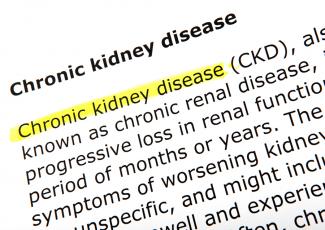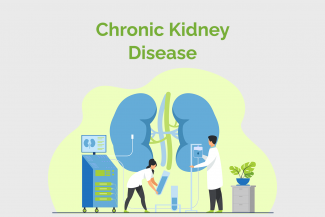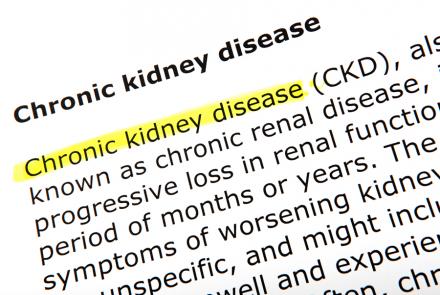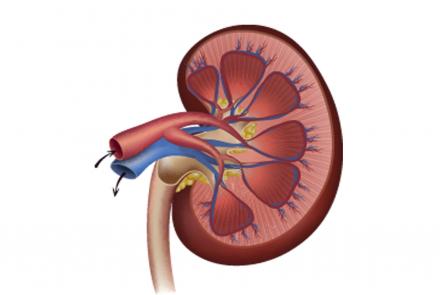
Different stages of Chronic Kidney Disease(CKD)
Stage 1: The eGFR (estimated GFR) shows normal kidney function but you have some pre-existing kidney damage or disease. eGFR is 90 or more ml/min/1.73m2. This is the first stage of CKD.
Stage 2: Mildly reduced kidney function and you are already known to have some kidney damage or disease.
Stage 3: Moderately reduced kidney function (with or without a known kidney disease. For example, an elderly person with ageing kidneys may have reduced kidney function without a specific known kidney disease.)
Stage 3A: eGFR- 45 to 59 ml/min/1.73m2
Stage 3B: eGFR 30 -44 ml/min/1.73m2
Stage 4: Severely reduced kidney function (with or without known kidney disease). eGFR is15 to 29 ml/min/1.73m2
Stage 5: Very severely reduced kidney function. This is sometimes called end-stage kidney failure or established renal failure. eGFR ≤ 15 ml/min/1.73m2
Complications of Chronic Kidney Disease include:
Cancer: Patients with end-stage renal disease are at increased overall risk for cancer. This risk is particularly high in younger patients and gradually diminishes with age.
Fluid and electrolyte imbalance:
- Dehydration (excessive loss of body waterwith an accompaning disruption of metabolic processes)
- Edema (abnormal accumulation of fluid in the interstitium)
- Hyperkalemia (increase in potassium levels in blood)
- Metabolic acidosis (body producing too much acid when kidneys are unable to remove enough acid from the body)
Calcium, phosphate and bone complications:
- Hyperphosphatemia (abnormal elevated level of phosphate in blood)
- Hypocalcemia (low serum levels of calcium)
- Secondary hyperparathyroidism (excessive secretion of parathyroid hormone causing imbalance in calcium and phosphorus metabolism leading to multiple fractures in the body)
- Renal osteodystrophy (bone mineralisation deficiency due to electrolyte and endocrine derangements, i.e. hormonal disturbances)
Haematologic complications:
- Anaemia (decrease in hemoglobin content)
- Bleeding diathesis (an unusual susceptibility to bleeding due to hypocoagulation (decreased blood clotting)
Cardiopulmonary complications:
- Hypertension
- Congestive heart failure (inability to maintain sufficient pump action for blood flow)
- Cardiomyopathy (measurable detoriation of the function of the myocardium, heart muscle tissue)
- Pulmonary edema (abnormal accumulation of fluid in the lung area)
- Uremic pericarditis (a form of pericarditis i.e. inflammation of pericardium, the sac containing the heart)
Gastrointestinal complications:
- Nausea and vomiting
- Bleeding
- Esophagitis (inflammation of esophagus)
- Gastritis (inflammation of lining of stomach)
- Colitis (inflammation of colon)
Neuromuscular complications:
- Myopathy (muscular weakness that occurs due to combination of poor nutrition, hyperparathyroidism, vitamin D deficiency and disorders of electrolyte metabolism, mainly seen in association with CKD)
- Peripheral neuropathy (damage or disease affecting peripheral nerves)
- Encephalopathy (disease of the brain)
Dermatologic complications:
- Sallow colour due to urochrome (end product of haemoglobin breakdown) deposition under skin as impaired kidneys fail to remove excess urochromes from the body
- Pruritis (itching of the skin)
- Dermatitis (inflammation of skin)









